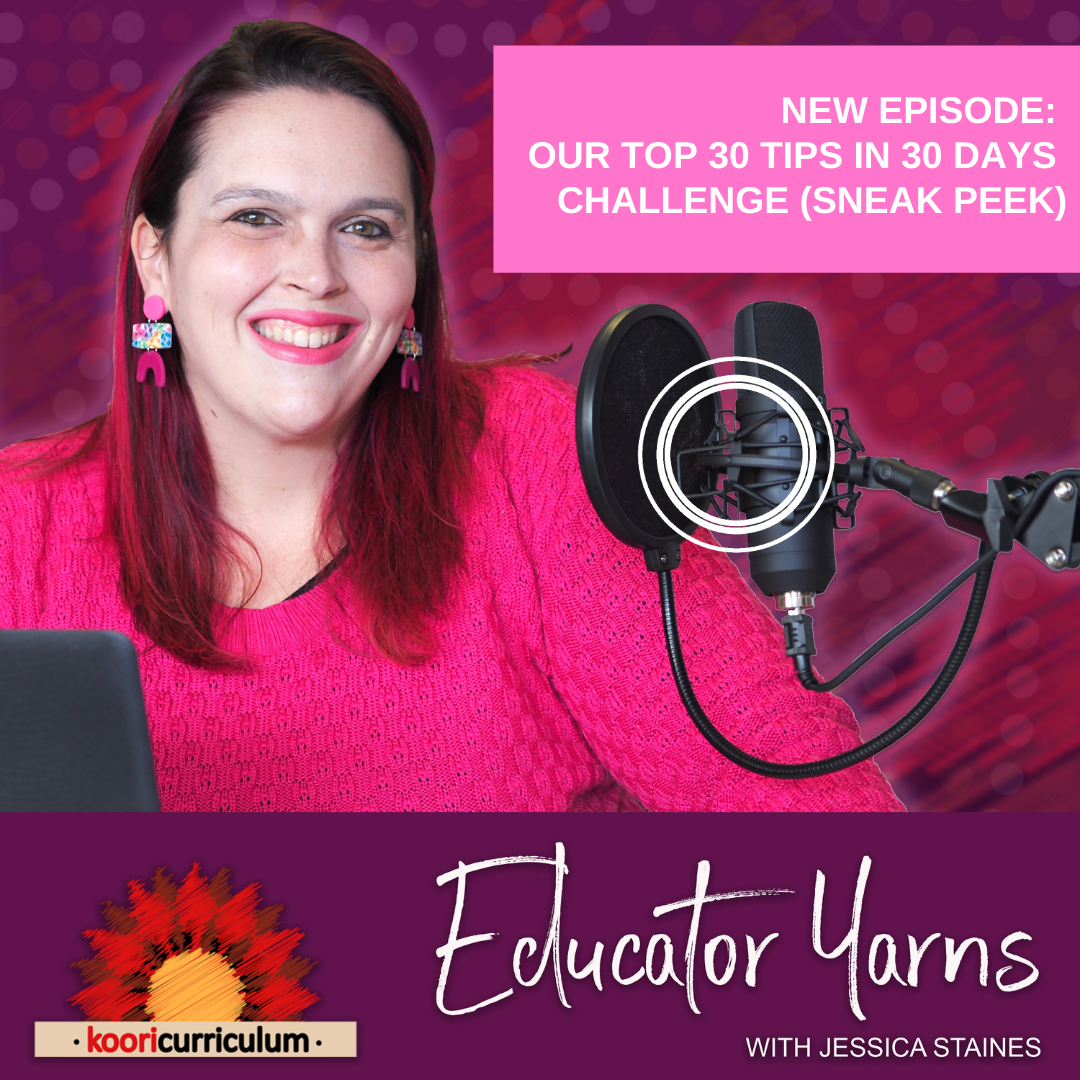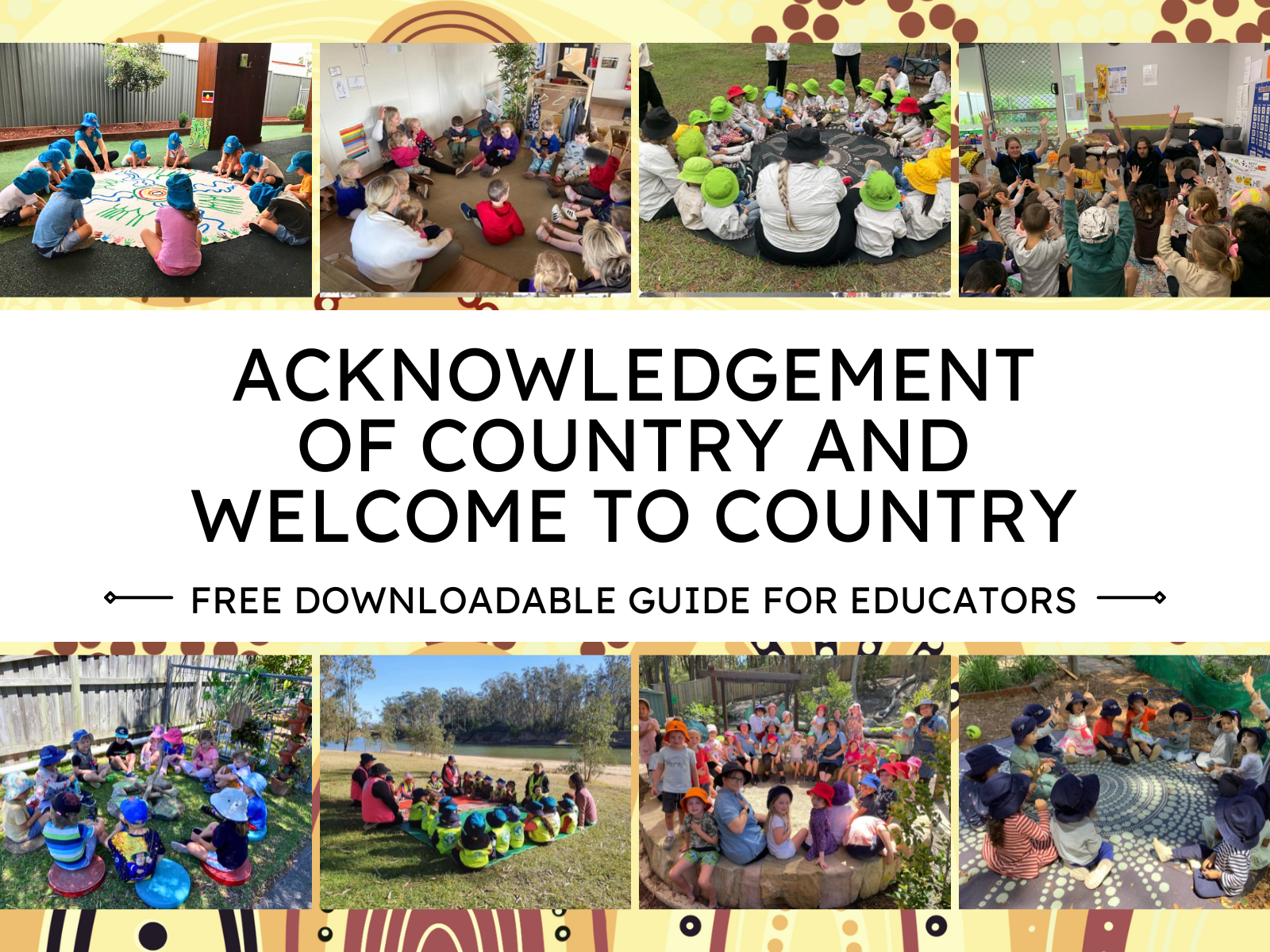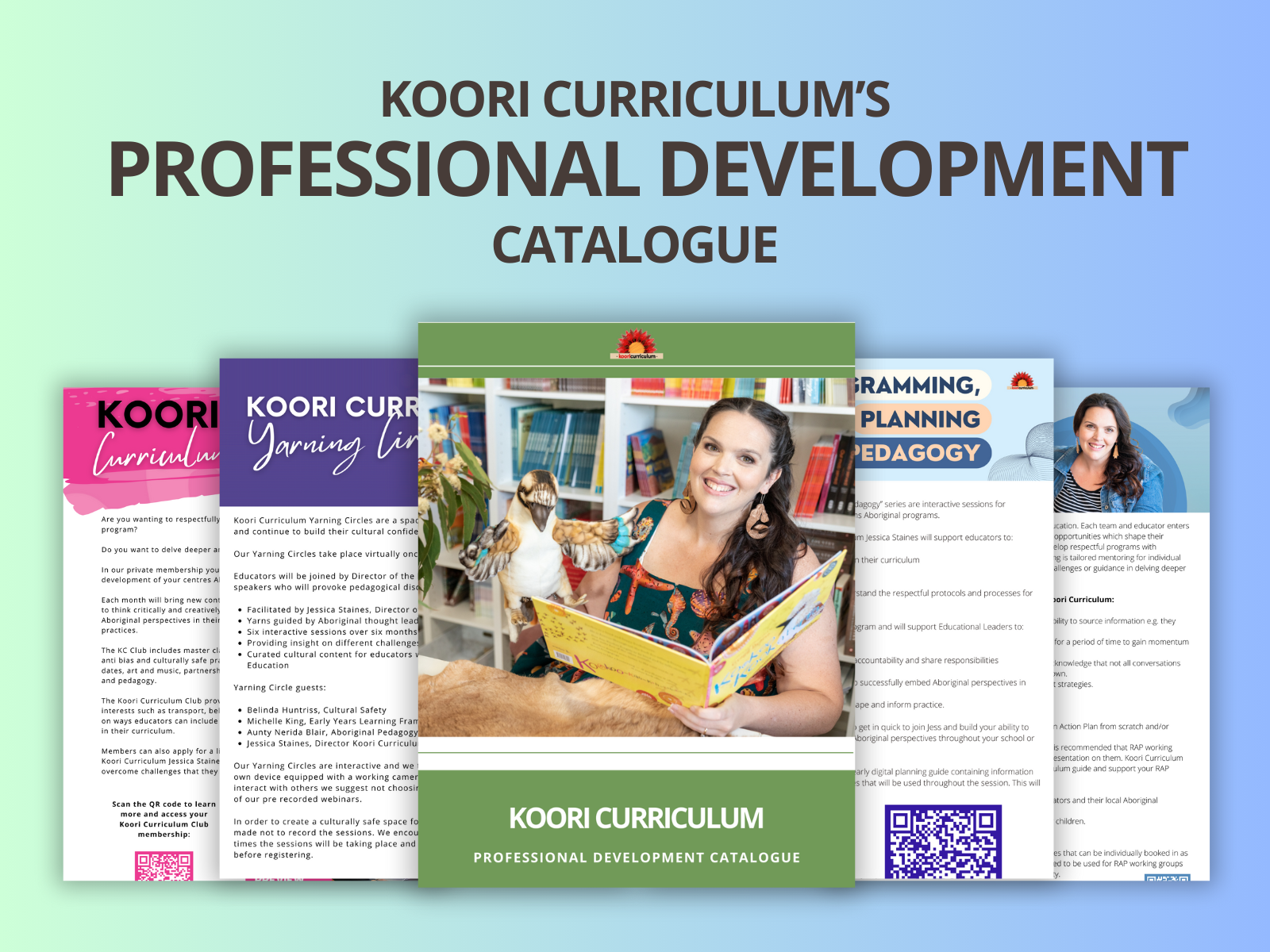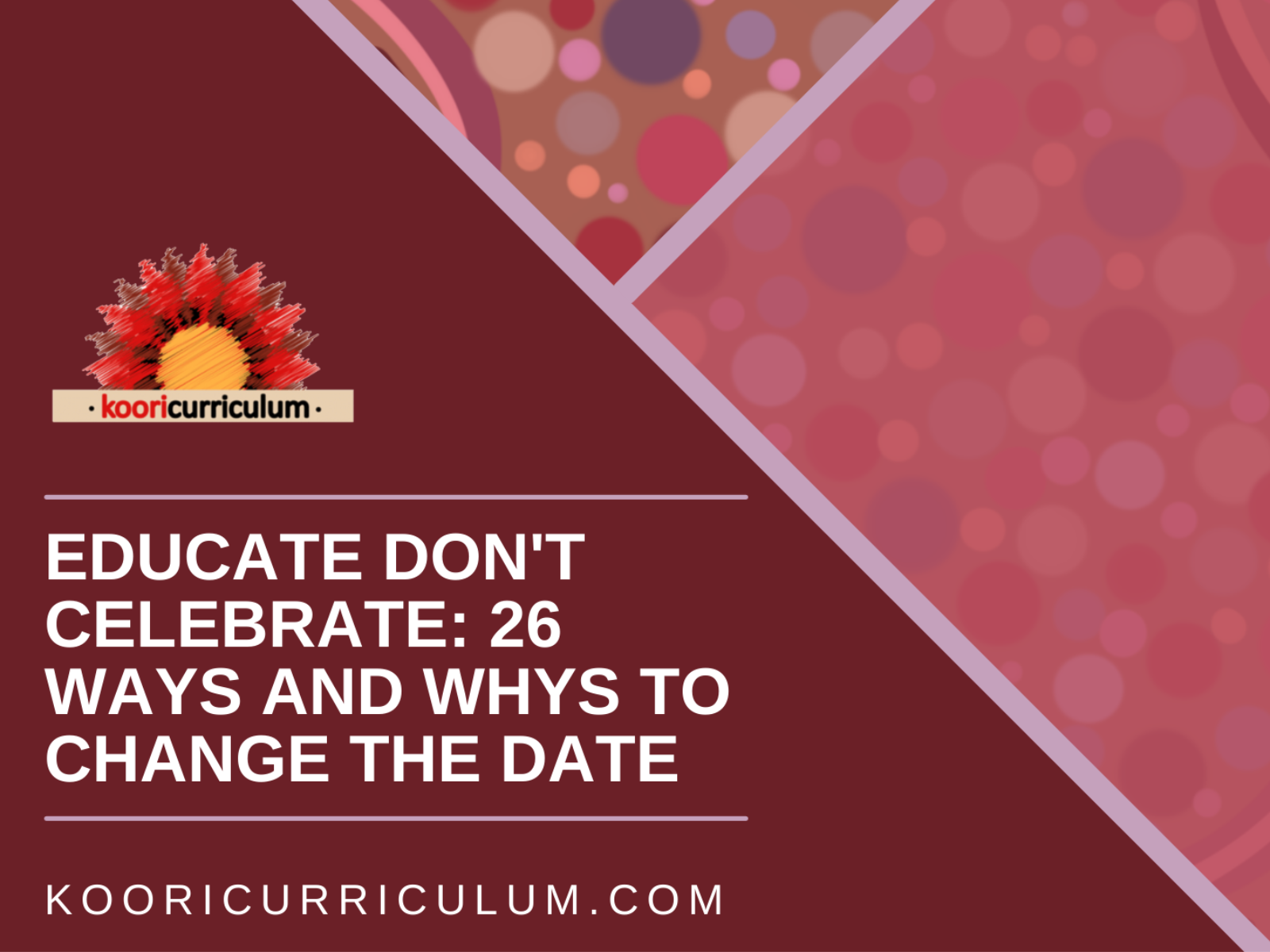
Educator Yarns Episode 15: Our top 30 tips challenge (sneak peak!)
We are currently offering a free series on kooricurriculum.com called “Our top 30 tips in 30 days” and today I am sharing our favourite 5 for those who are looking for a little sneak peek into the series.
In this episode I dive into:
- Tip 1: Just Start
- Tip 2: Reflect on your why
- Tip 3: Plan
- Tip 4: Take things slow
- Tip 5: Be realistic
To join this free series and hear all 30 tips, visit our website and search for “top tips.”
Show Notes Episode 15
Welcome to the Koori Curriculum Educators podcast. My name is Jessica Staines, Wiradjuri woman, early childhood teacher, and director of the Koori Curriculum. I would like to acknowledge the Darkinjung, the traditional custodians of the land on which this podcast is being recorded. I'd like to acknowledge the elders both past, present, and emerging, and all Aboriginal and Torres Strait Islander listeners.
If you're listening to this podcast in real time, you will know that we are in the middle of the Covid pandemic, and many of us are spending the next couple of weeks, at least, in isolation. To support educators through this time who are finding innovative ways to create an online curriculum for children and families that are choosing to stay home, rather than attend our early learning services, we have put together quite a few social segments, which you can find on our website, www.kooricurriculum.com, to share with families, to ensure that they are staying connected to culture and make embedding Aboriginal perspectives easier for you.
These include a story time, where we'll be reading stories that you can find on our online shop, that are by Aboriginal authors or illustrators. A show and tell that gets released every Wednesday, where I'll be showing you different Aboriginal artefacts, and artworks, and resources, that I've collected. As well as a couple of cooking segments of ways that you can use bush tucker in the kitchen, and at home with children. Plants that you probably have in your backyard, that you never knew all the wonderful functions and purposes that they served. So be sure if you were creating an online Covid curriculum and want to find ways to include an Aboriginal perspective, visit our website, www.kooricurriculum.com, and check out the resource tab, and all the wonderful segments that we're creating for you.
Hi everyone. I hope that this podcast finds you or happy well and safe. Today I'm flying solo once again, to share with you an incredible offer that we are currently running through the Koori Curriculum. A little while ago, we launched a course, our top 30 course, which includes our Top 30 tips to support educators to include Aboriginal perspectives in their programme. Over a 30 day period, educators receive an email daily with a tip and a motivational inspirational and supportive video to set them on their pathway, to include Aboriginal culture and knowledges in their everyday programme. I, today, will be sharing with you five of those tips. And if you like what you hear, you can access the rest of the 30 via the Koori Curriculum website, and sign up to start receiving daily emails for yourself and maybe your team.
So our top one tip is to just start, and I can confidently say that the biggest cause of hesitation surrounding the inclusion of Aboriginal perspectives in early childhood is, the fear of getting it wrong. Many early learning teams suffer from a debilitating form of paralysis, as they are concerned about being offensive, tokenistic, and stereotypical. And this concern is so great that often we see that they do nothing at all. There is no training or book that will ever eliminate the risk of making a mistake. Even those of us that consider ourselves to be thought leaders in this space can still make errors. Some of my biggest learning curves have been through critically reflecting on experiences and practises that weren't so great. For me they affirmed what this work is and should be and what it is not.
This quote from Brene Brown, is something that I hold close to me and it says, "Vulnerability is the birthplace of innovation, creativity, and change." And I think that this has had great impact on my thinking and feelings surrounding the common fear of being stereotypical. Beginning both your personal and professional exploration of Aboriginal cultures, knowledges, worldviews, theories, and philosophies, can be confronting and at times overwhelming. However, I really do implore you to be brave and just start. Take that first step and jump on in.
Our second tip is to reflect on your why. And this is so important to be sure on your why, and what is your team's collective why? Why is it important to embed an Aboriginal perspective in your programme? Is it just as important when you have Aboriginal children attending the service, or is it equally as important for non-indigenous children as well? When reflecting and consolidating your teams why, be sure to consult our professions overarching frameworks, such as the Code of Ethics, the National Quality Standard, the Early Years Learning Framework, the Anti-biassed Curriculum, and the Aboriginal Early Childhood Practise Guide.
I would strongly suggest taking time to write a reflective journal and consider your own experiences, relationships, and opportunities, that attribute to why including Aboriginal perspectives in your curriculum is important or not. Everyone has a different experiences and exposure to Aboriginal people and our culture, and therefore it is important to separate your personal values, feelings, and beliefs, and your professional philosophy. At times, your professional and personal philosophies will compliment one another. And at other times they're going to conflict. As educators, it's important that we are conscious of any biases or conflicts we may have, so we can work on resolving them in a professional space. This part of the process is also about creating a team understanding, that it's not our personal opinions that dictate pedagogical practise, and this can be an incredibly challenging to navigate with your team. But it is essential and critical to this process.
The third tip that I'm sharing with you is to plan. When I begin working with an early learning team, the first thing that I do is sign them up for a reconciliation action plan through the Narragunnawali platform. By completing a quick team reflective survey, I can quickly ascertain where the team is at. It allows me to grab a snapshot of the services, strengths, and highlights, and possible goals, that they need to work towards. I view Reconciliation Australia's RAP programme as a roadmap for teams. It allows them to set goals and break these down into deliverable actions. The Narragunnawali platform also allows for the allocation of actions to specific team members. I personally love this function, as it enables accountability and the option of setting due dates, that supports the momentum of the process. This programme aids in bringing about cultural change in an early learning service, and it is free, and it hosts a wealth of information. For further details about setting your reconciliation action plan, you can also check out our reconciliation webinar, which is on our website, www.kooricurriculum.com.
Tip number four is to take things slow. With any one early learning team there can be a spectrum of confidence regarding Aboriginal programmes. Everyone has had different experiences, relationships, and opportunities, and it is critically important not to make any assumptions. For some educators contemplating and discussing aspects of Aboriginal history and reconciliation can be confronting and overwhelming. Moving at a slow pace that is comfortable for everyone is key. We want to bring the whole team along on the journey together and not create a bigger gap between those that are confident and those that are not. It is essential not to view reconciliation action plans, as I mentioned previously in tip number three, as a ticker box approach. It is not about checking off a list of deliverables, instead it is about making intentional thought through sustainable decisions. To ensure that any decisions regarding Aboriginal programmes are maintained and remain embedded, it is important not to rush, and plod along at a slow continual pace where all team members own and contribute to the decision making process.
My final tip for this podcast is, number five, to be realistic. It's really important that you set achievable and realistic goals that your team can achieve. This can aid in developing the team's confidence, and their willingness to tackle bigger obstacles and challenges. It's a good idea to write down your goals and order them pertaining to low and high priority, as well as long and short term. With some of your longer term goals, break these down into a series of short term goals and milestones. By breaking bigger goals down, they can feel more achievable and it can be easier to track progress. It can also help build your team's morale when they can see signs of success.
I hope my five top tips have enticed you enough to jump on in and do our top 30 tips in our 30 day challenge. So to get yourself signed up, you need to visit our website www.kooricurriculum.com, and type into the search tab, Top 30, and you will see your place to subscribe. I hope you find them useful. I'd love to hear your feedback. If you have found this episode helpful, we would really appreciate if you could leave us a review and a five star rating, to help make this podcast more discoverable to other early childhood educators, who are wanting to learn how to best embed Aboriginal perspectives, just like you.
Thanks for joining me yarn with you all again soon. Thanks, bye.



